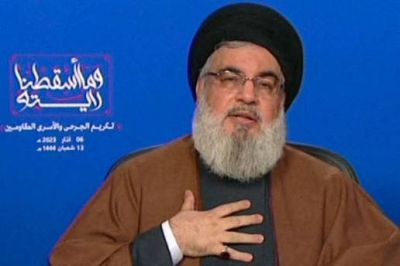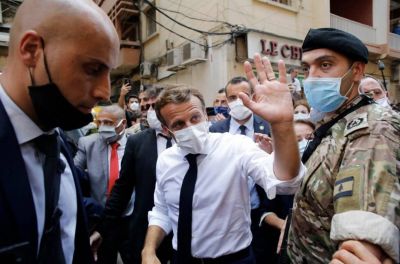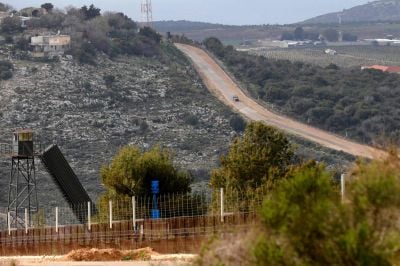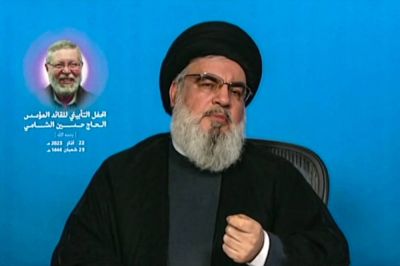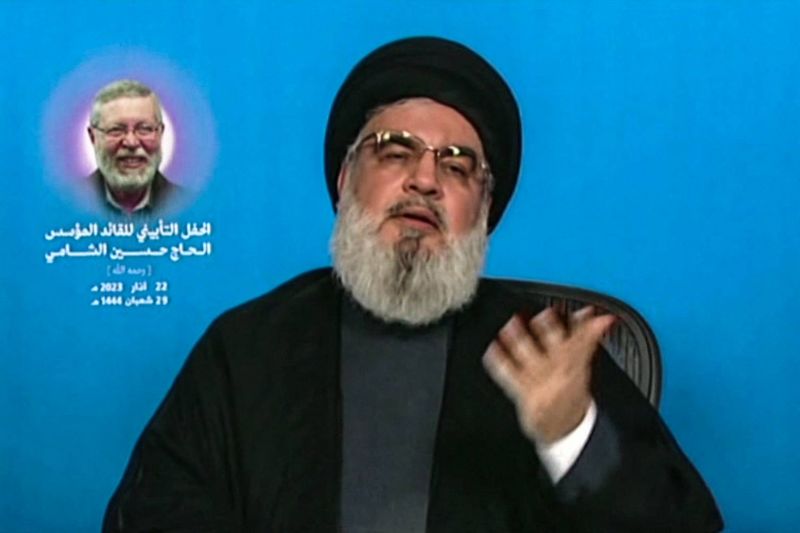
An image grab from Hezbollah's al-Manar TV on March 22, 2023, shows Hezbollah Secretary-General Hassan Nasrallah delivering a televised speech. (Credit: AFP/Al-Manar)
BEIRUT — Hezbollah Secretary-General Hassan Nasrallah said Wednesday that Lebanon was not a subject of discussion between Iran and Saudi Arabia, but he hopes their deal has "positive" repercussions on the Lebanese presidential elections.
The two regional heavyweights sealed a deal on March 10 to restore diplomatic relations. Lebanon's presidential election has been stalled since October.
Nasrallah said he will remain silent on the reported bombing in northern Israel last week, which Tel Aviv had attributed to Hezbollah. He also renewed his threats toward Israel by promising a "firm and rapid" retaliation to any Israeli aggression against Lebanon.
His Wednesday speech, which was broadcasted live, honored one of Hezbollah's founders, Hussein Chami, who passed away on March 16.
An 'internal decision par excellence'
Commenting briefly on the presidential vacancy in Lebanon, Nasrallah said "things are moving slowly."
"Efforts continue and we hope that regional contacts and the Iranian-Saudi agreement ... will help achieve the [presidential] deadline in Lebanon," he added. "But it primarily depends on the internal scene. The decision is internal par excellence."
"Some say that the Iranians and the Saudis have agreed on an annex concerning Lebanon. This is not true. The word 'Lebanon' was not even mentioned in the Iranian-Saudi agreement," Nasrallah continued.
Lebanon has been without a president since Oct. 31, 2022, when the term of former president Michel Aoun, a Hezbollah ally, came to an end. Parliament has held 11 presidential electoral sessions, all of which have failed due to the lack of customary political agreement between different parties.
Parliament Speaker Nabih Berri has not scheduled the next electoral session.
Several opposition parties support the candidacy of Zgharta MP Michel Moawad, while Hezbollah and its Shiite ally, the Amal Movement, support the candidacy of Marada Movement leader Sleiman Frangieh.
Neither Moawad nor Frangieh have yet garnered the necessary votes to be elected president.
On March 6, Nasrallah announced his party's official endorsement of Frangieh's candidacy. Berri did the same just a few days earlier, although Frangieh has still not officially announced his candidacy.
On March 10, only four days after Nasrallah announced his support for Frangieh, Saudi Arabia and Iran formalized the restoration of their diplomatic relations— a new geopolitical deal that seems to impact Hezbollah's political plans.
A few hours after the announcement, Nasrallah said in a televised speech that the normalized relations are a "very welcome change" that will help the region and Lebanon.
A few days earlier, he advised his opponents and political allies not to count on an Iranian-Saudi compromise to unlock the presidential election. Some observers believe the Iranian-Saudi rapprochement will increase Frangieh's chances of being elected, while others claim the opposite.
The attack in Israel and threats
In Wednesday's speech, Nasrallah made his first comments on the bombing that reportedly hit northern Israel on March 13. Israel blamed Hezbollah for the bombing.
"There was an incident last week in northern occupied Palestine that caused confusion among the enemy," Nasrallah said. "Some have commented widely on Hezbollah's silence. This silence is part of its battle management."
On March 15, the Israeli army announced that it had killed a suspect wearing an explosive belt two days earlier in northern Israel, accusing Hezbollah of involvement.
The suspect, suspected of infiltrating Israel from Lebanon, was shot by Israeli forces in the north of the country, according to the Israeli army. Hezbollah has so far remained silent on the attack.
For its part, the United Nations Interim Force in Lebanon (UNIFIL) claimed it did not "observe any crossing" from Lebanon to Israel.
On the same day of the incident, a small group unknown to the public and calling itself "Revolutionary Council of the Galilee Forces-Lone Wolves," claimed responsibility for the attack, denying the Israeli version of events.
"The enemy is confused and knows nothing," Nasrallah said Wednesday. "Does Hezbollah have to explain itself to defend itself? Silence is part of the political, psychological and political battle. We are not obliged to comment on every incident. And sometimes silence is equivalent to comment."
Nasrallah then made a threat against Israel: "Launching a war against Lebanon could lead to a war in the whole region, and this is what the enemy fears."
"The Resistance will respond firmly and quickly to any Zionist aggression against Lebanon, military or security, against anyone in Lebanon, whether Lebanese, Palestinian or other," he warned.
On Tuesday, an Israeli military vehicle hit a mine while it was near the Lebanese border in the village of Aita el-Chaab in South Lebanon, injuring several people. The explosion injured two people, one critically, according to the Israeli army.
However, Hezbollah-owned TV channel Al-Manar, which reported on the incident early in the afternoon, claimed three people were injured.
In 2006, the last major confrontation between Israel and Hezbollah left more than 1,200 dead on the Lebanese side, mostly civilians, and 160 dead on the Israeli side, mostly soldiers.
